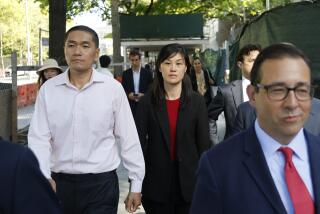Huang Had a Policy Role at Commerce, Papers Show
- Share via
WASHINGTON — Newly disclosed Commerce Department documents indicate that controversial fund-raiser John Huang was considered an expert on Asian affairs when he worked at the agency and had a voice in U.S.-Asia commercial policy, despite Clinton administration assertions that his duties there were largely administrative.
The 1995 documents, obtained from congressional sources Wednesday, were written by Assistant Commerce Secretary Charles F. Meissner in December 1995, as Huang, who later became the central figure in a scandal over Asian fund-raising by the Democratic National Committee, was leaving the department to become a fund-raiser for the party. Meissner wrote that “Huang’s expertise on the Asia Pacific region” was “required” to help with “commercial policy planning” at the agency and proposed that he be hired as a temporary consultant to provide continued advice and allow a smooth transition.
Commerce officials have contended that Huang had no role in Asia policy while he was a middle-level official at the agency from July 1994 until December 1995.
The issue is a sensitive one because of looming questions over whether Asian donors of large amounts of money later solicited by Huang were given insights into U.S. policy or other favors in return for their contributions. During his tenure at the Commerce Department, records have shown, Huang attended policy meetings, received classified intelligence briefings and was in touch with some donors who later gave large sums of money to the Democrats.
At the time Huang was at the Commerce Department, his telephone logs show that he also made at least 70 calls to his previous employer, a Los Angeles bank owned by an Indonesian family with close ties to President Clinton and sprawling business interests throughout Asia.
Asked about the 1995 documents, a Commerce Department spokeswoman repeated that Huang’s responsibilities primarily concerned administration and personnel. But she also acknowledged for the first time that “some of his responsibilities could include commercial policy planning,” specifically assisting U.S. businesses in creating jobs overseas, particularly in Taiwan.
The spokeswoman said that Meissner’s proposal to hire Huang for up to 30 days was denied as “neither appropriate nor necessary.”
Such a contract would have granted Huang the extraordinary dual role of advising the U.S. government on actions in Asia at the same time that he was raising political donations from the Asian American community to support Clinton’s reelection.
Although the proposal was rejected, Commerce officials disclosed that Huang was given an extension of his top-secret security clearance in anticipation that he would get the consulting job. He retained the clearance for a year while he was raising money because Commerce officials failed to have it lifted.
“To the best of our knowledge, there’s no reason he would have known he had this clearance,” said a Commerce official, speaking on condition of anonymity. “To the best of our knowledge, he did not make use of it.”
Huang’s attorney, John C. Keeney Jr., said that he could not comment on the matter or the Commerce Department documents.
The documents are expected to heighten the controversy over the question of whether Huang or others mixed policy and politics in raising money for the Democratic Party. The Justice Department is investigating Huang’s activities at Commerce and congressional committees plan to target his policy role in upcoming hearings.
Rep. Benjamin A. Gilman (R-N.Y.), chairman of the House International Relations Committee, wrote to Commerce Secretary Mickey Kantor on Tuesday posing a series of questions about the newly available documents. Among them was whether the department was concerned about “a possible conflict of interest” if a Democratic fund-raiser had served simultaneously as a consultant at Commerce with top-secret security clearance. Gilman also inquired about Huang’s purported policy role.
The key document made available Wednesday is an official “Request for Personnel Action” signed by Meissner. He sought approval for Huang, then principal deputy assistant secretary for international economic policy, to consult “on the Asia Pacific regional commercial policy” after leaving. Huang was to be paid $9,957 for the month.
Meissner, who was assistant secretary for international economic policy, was killed along with Commerce Secretary Ronald H. Brown and 32 others when their plane crashed in Croatia last April. Meissner was one of Brown’s chief aides and helped develop international trade policy and promoted U.S. exports.
Huang’s appointment as a consultant would have taken effect on Dec. 4, 1995, the day he began work at the Democratic National Committee as a finance vice chairman specializing in raising money in the Asian American community.
In another memo, dated Dec. 13, 1995, a Commerce administration official wrote by hand: “While I think this issue is dead--it may not be. Hold on to this package for a while or at least until the smoke clears.”
A Commerce spokeswoman said that Alan Neuschatz, the director of administration for the department’s International Trade Administration, added that notation because he thought Meissner might appeal rejection of his proposal but he did not.
Huang’s security clearance was extended for a year because Commerce and Defense agencies “did not communicate to the extent that they should have” about his status, the Commerce official said. This matter is being reviewed by the Commerce Department’s inspector general, sources said.
More to Read
Get the L.A. Times Politics newsletter
Deeply reported insights into legislation, politics and policy from Sacramento, Washington and beyond. In your inbox twice per week.
You may occasionally receive promotional content from the Los Angeles Times.










